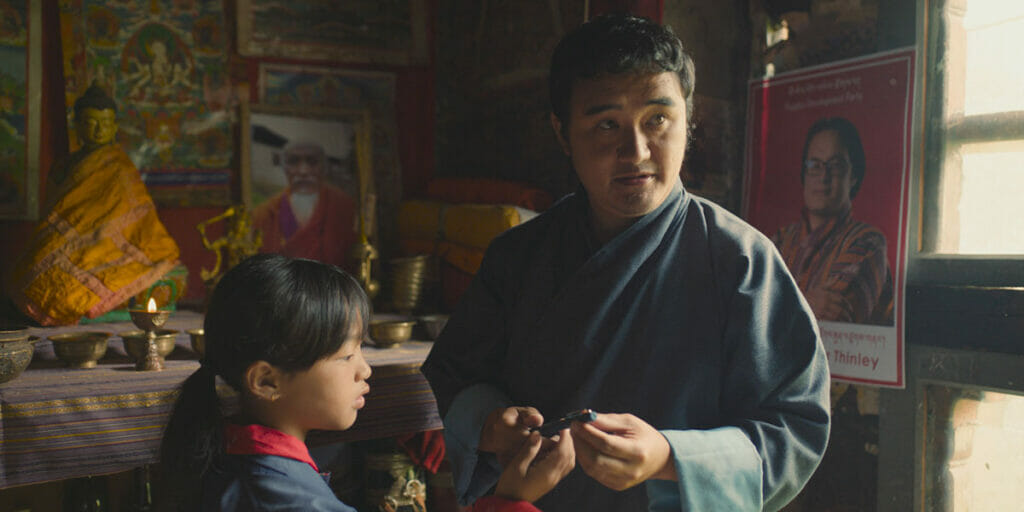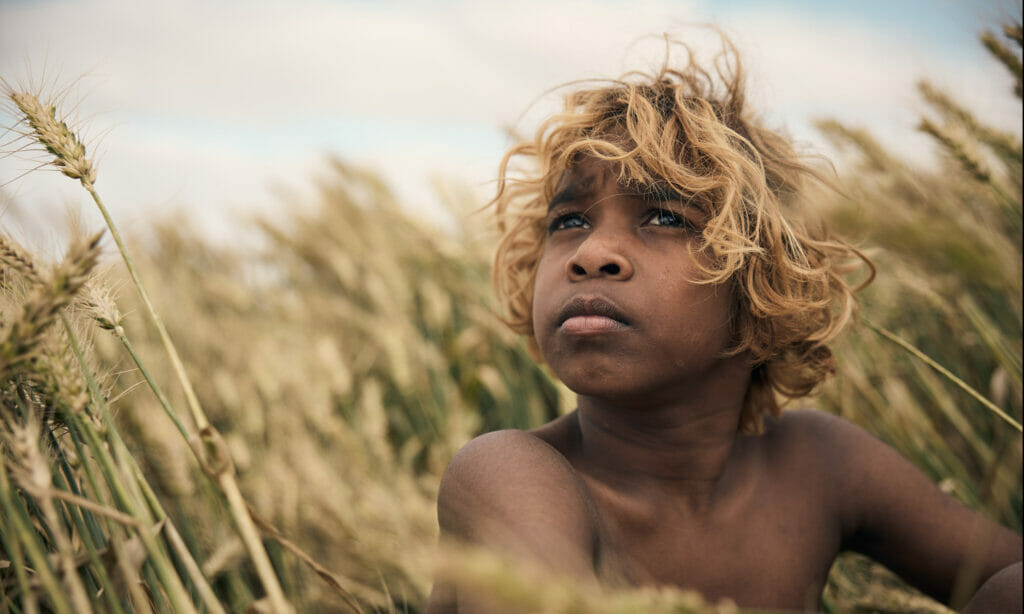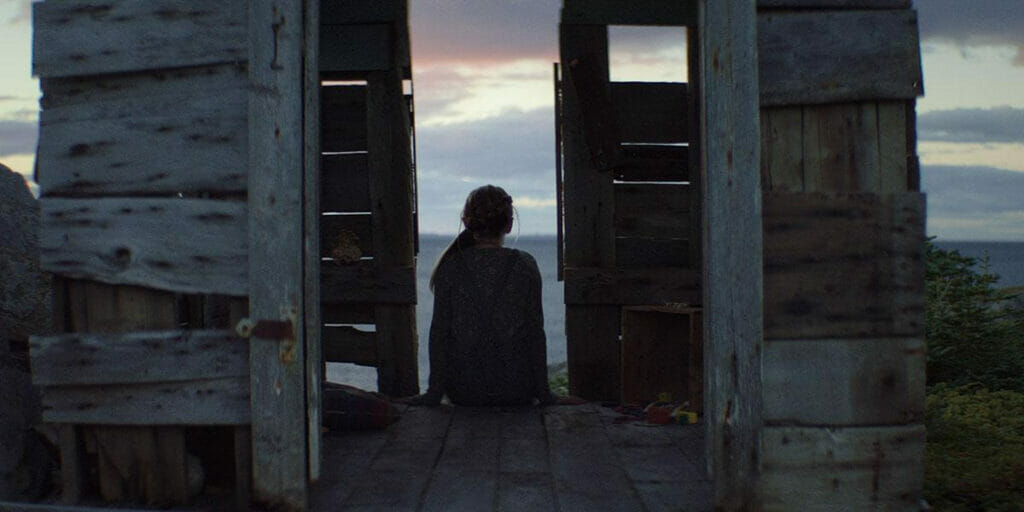A trio of quirky films offer unique stories, but Pawo Choyning Dorji’s gentle comedy is the true standout.
This piece was written during the 2023 WGA and SAG-AFTRA strikes. Without the labor of the writers and actors currently on strike, the works being covered here wouldn’t exist.
Having already made a splash with the Oscar-nominated Lunana: A Yak in the Classroom, Bhutanese filmmaker Pawo Choyning Dorji lives up to that initial promise with his follow-up feature, the low-key charmer The Monk and the Gun. It’s a film that tackles any number of weighty topics, including the meaning of participatory democracy and the spread of gun culture, but does so in a manner that somehow manages to be both cheerfully whimsical and quietly profound in equal measure.
The film is set in 2006 as Bhutan, following the voluntary abdication of its king, tries to wrap its collective head around the notion of actually voting for its leaders. A mock election is to be held for practice in anticipation of the real thing, and volunteers are sent out to help register voters and explain the process. One such volunteer, Tsering (Pima Zangpo Sherpa), arrives in the remote village of Ura and finds the task to be more difficult than she imagined: how can one register to vote when they are not even certain of their actual date of birth? The impending election also begins to drive wedges between some members of the close-knit community. One family is split between a man (Shoeing Jatsho) who sees a chance to relocate to the city by helping one particular candidate, inspiring the ire of his mother-in-law, who supports the opposition, and the exasperation of his wife, who is disinterested in politics and resents being caught in the middle.
While all of this is going on, the village’s long-serving Lama (Kelang Choejey) summons Tashi (Tandin Wangchuk), one of his most loyal disciples, and presents him with a most unusual task. He wants Tashi to procure a gun for him for reasons that he will not explain other than to suggest that it’s related to some ritual involving the full moon to be performed in four days time, the same day as the mock election. Astoundingly, Tashi is able to secure a Civil War-era rifle from a man in the region who is happy to turn it over to the Lama. What the man doesn’t mention is that he sort of promised to sell the very valuable weapon to an American gun collector (Harry Einhorn) before giving it to Tashi, forcing the man and local interpreter Benji (Tania Sonam) to track Tashi down during his journey back to the Lama in the hopes of trading a nice new gun for that old thing.

Dorji is juggling a number of storylines here, but one of the most winning aspects of the film is that you never get the sense that you’re following the machinations of a screenplay. There is a loose, documentary-like style to the proceedings that allows the subplots and characters (all nicely portrayed by a largely non-professional cast) to play off of each other in a manner that at times suggests the films of Jonathan Demme. At the same time, there is a distinct formal precision to Dorji’s direction as he moves from quiet musings about the nature of politics and the attempts by the village to join in the modern world (including their first exposure to such touchstones as James Bond and the Spice Girls) and what they might lose in the process to beautifully choreographed moments of slapstick.
Admittedly, the final revelation about the Lama’s need for a gun proves to be slightly anticlimactic but everything else about the film—even where it goes after that revelation—is so cheerful and thoughtful that few viewers will mind it that much. Other than that, The Monk and the Gun is kind of a delight, the sort of under-the-radar film that runs the risk of getting lost in the shuffle (though Bhutan has made it their entry for this year’s International Film Oscar) but which will stick in the mind of those that see it long after the more heavily hyped items have been blessedly forgotten.
The New Boy, the new work from acclaimed Aboriginal filmmaker Warwick Thornton, is a defiantly odd film that combines autobiographical elements from Thornton’s own childhood upbringing in a Christian boarding school with more overtly fantastical elements in a manner that is ultimately more perplexing than edifying. Set in the 1940s, it opens as a young Aboriginal child (Aswan Reid), referred to throughout simply as New Boy, is captured by authorities and sent to a remote monastery overseen by the wine-guzzling Sister Eileen (Cate Blanchett) as part of Australia’s effort to essentially eradicate Aborigines for good.
Like the other boys, he will be baptized and raised as a Christian and, upon turning 13, he will be sent off to work as a sheep shearer. Unlike the other boys, however, New Boy appears to have supernatural powers (such as the ability to heal wounds) of a divine nature. It’s an idea that drives the initially sympathetic Sister Eileen (who is also concealing the news of the death of the cleric supposedly in charge) to distraction, because there is no place in her belief system for the notion of spiritual gifts outside of the tenets of Christianity.

At least I think that is what is going on. The New Boy is so deliberately enigmatic at times that it’s difficult to discern exactly what Thornton is going for here. The combination of realistic elements with outright magical realism is daring enough but it didn’t quite work for me. The more down-to-earth story elements involving New Boy trying to make sense of his new surroundings and the attempts to keep him from his own historical legacy are strong and sure, driven in large part by the quietly powerful performance by Reid as the mystery child.
However, the more fantastical elements, mixed with heavy-handed religious symbolism (including our hero experiencing stigmata on several occasions), don’t add much to the story and mostly serve as flashy distractions. Another element that doesn’t work is, strangely enough, Blanchett’s performance. Even if she had managed to turn in some truly stellar work (she doesn’t), her undeniable presence only serves to throw the film’s delicate balance out of whack whenever she appears.
The New Boy is undeniably ambitious and it probably does deserve some credit for boldly swinging for the fences. However, the execution of those ambitions proves to be faulty and leaves viewers with a film that is ultimately a clash of themes and ideas that may have seemed provocative and interesting on paper, but which simply don’t quite play out properly on the screen.
The New Boy may have been disappointing, but when it comes to enigmatic stories about isolated communities that are visited by children with fantastic powers they’re ultimately unable to deal with, I prefer it to Chris Reed’s The King Tide, a misfired drama that introduces a potentially provocative and timely premise and then allows it to get bogged down in a sea of murky pretentiousness.

Set on a remote island off the Newfoundland coast, the film opens as the townspeople discover and rescue an infant girl from a boat that has capsized along their shore, only to discover that she seems to possess mysterious powers. Ten years later, the island has completely cut itself off from the outside world and become a thriving self-sufficient community, but their independence is based entirely on the presence of that girl, Isla (Alex West Lefler), and her astounding abilities, which range from curing illnesses to providing bountiful amounts of cod for the fishermen to catch.
Every day, the locals line up at the house Isla shares with adoptive parents Bobby (Clayne Crawford) and Grace (Lara Jean Chorostecki)—neither of whom seems to have aged a day since taking her in—to receive blessings and cures for anything that might be ailing them. This is all well and good for everyone (even Isla seems completely content) but the town has relied so long on her abilities that they have lost the ability to fend for themselves. When an unexpected tragedy leads to the loss of Isla’s abilities and a particularly monstrous workaround to that problem is discovered, the town finds itself divided between those who want to continue using her powers, no matter the cost, and those like Bobby and Grace who are more concerned with her well-being than her abilities, even if it means betraying the promise that they made to the other townspeople.
By telling a story illustrating the dangers of a community of people succumbing to increasingly toxic groupthink while in the thrall of a person they look upon as their sole savior, The King Tide is not exactly the most subtle of films. The problem is that the metaphorical aspects are so prevalent that they wind up overwhelming everything else. Since we’re never allowed to see any of the characters as anything more than symbols, there is no real sense of loss or horror when things go bad and everyone turns against each other as it builds to its ultimately abrupt and unsatisfying finale.
This is especially frustrating because the performances by Lefler, Crawford and Frances Fisher (who plays the outwardly gentle and internally monstrous matriarch of the community) are good enough to make you wish that the screenplay offered them and the other actors more of a chance to play real people instead of walking symbols. Unfortunately, they are stuck in a film that has all sorts of lofty ambitions, but which comes across like a bizarre hybrid of Peter Greenaway’s The Baby of Macon and Shel Silverstein’s The Giving Tree as directed by M Night Shyamalan on an off day.
Read next: The Spool's Best New Releases
Streaming guides
The Best Live TV Streaming Services With Free Trial
The praises of live TV streaming services don’t need to be further sung. By now, we all know that compared to clunky, commitment-heavy cable, live TV is cheaper and much easier to manage. But just in case you’re still on the fence about jumping over to the other side, or if you’re just unhappy with ... The Best Live TV Streaming Services With Free Trial
How to Watch Power Book III: Raising Kanan Season 3
Season 3 of the hotly anticipated Power spin-off, Power Book III: Raising Kanan, is arriving on Starz soon, so you know what that means: it’s the ’90s again in The Southside, and we’re back with the Thomas family as they navigate the ins and outs of the criminal underworld they’re helping build. Mekai Curtis is ... How to Watch Power Book III: Raising Kanan Season 3
How to Watch Doctor Who: 60th Anniversary Specials
Ladies and gentlemen, we’re so back! To celebrate Doctor Who’s 60th anniversary, the BBC is producing a three-episode special starring none other than the Tenth/Fourteenth Doctor himself, David Tennant. And to the supreme delight of fans (that would be me, dear reader), the Doctor will be joined by old-time companion Donna Noble (Catherine Tate) and ... How to Watch Doctor Who: 60th Anniversary Specials
Which Netflix Country has Interstellar?
Maybe you’ve just seen Oppenheimer and have the strongest urge to marathon—or more fun yet, rank!—all of Christopher Nolan’s films. Or maybe you’re one of the few who haven’t seen Interstellar yet. If you are, then you should change that immediately; the dystopian epic is one of Nolan’s best, and with that incredible twist in ... Which Netflix Country has Interstellar?
Which Netflix Country Has Each Movie of The Hunger Games?
For whatever reason, The Hunger Games series isn’t available in the same countries around the world. You’ll find the first and second (aka the best) installments in Hong Kong, for instance, but not the third and fourth. It’s a frustrating dilemma, especially if you don’t even have a single entry in your region, which is ... Which Netflix Country Has Each Movie of The Hunger Games?
How to Watch ESPN With A Free Trial
One of the major concerns people have before cutting the cord is potentially losing access to live sports. But the great thing about live TV streaming services is that you never lose that access. Minus the contracts and complications of cable, these streaming services connect you to a host of live channels, including ESPN. So ... How to Watch ESPN With A Free Trial
How to Watch Paramount Network With a Free Trial
To date, Paramount Network has only two original shows on air right now: Yellowstone and Bar Rescue. The network seems to have its hands full with on-demand streaming service Paramount+, which is constantly stacked with a fresh supply of new shows. But Yellowstone and Bar Rescue are so sturdy and expansive that the network doesn’t ... How to Watch Paramount Network With a Free Trial
How to Watch WE TV With a Free Trial
Previously “Women’s Entertainment,” We TV has since rebranded to accurately reflect its name and be a more inclusive lifestyle channel. It’s home to addictive reality gems like Bold and Bougie, Bridezillas, Marriage Boot Camp, and The Untold Stories of Hip Hop. And when it’s not airing original titles, it has on syndicated shows like 9-1-1, ... How to Watch WE TV With a Free Trial
How to Watch TNT Sports With A Free Trial
For many sports fans, TNT is a non-negotiable. It broadcasts NBA, MLB, NHL, college basketball, and All Elite Wrestling matches. And, as a bonus, it also has reruns of shows like Supernatural, Charmed, and NCIS, as well as films like The Avengers, Dune, and Justice League. But while TNT used to be a cable staple, ... How to Watch TNT Sports With A Free Trial
How to Watch Comedy Central With a Free Trial
It’s no coincidence that many of today’s biggest comedians found their footing on Comedy Central: the channel is a bastion of emerging comic talents. It served as a playground for people like Nathan Fielder (Fielder For You), Ilana Glazer and Abbi Jacobson (Broad City), Tim Robinson (Detroiters), and Dave Chappelle (Chappelle’s Show) before they shot ... How to Watch Comedy Central With a Free Trial
How to Watch FX With a Free Trial
You’d be hard-pressed to find a bad show airing on FX. The channel has made a name for itself as a bastion of high-brow TV, along with HBO and AMC. It’s produced shows like Atlanta, Fargo, The Americans, Archer, and more recently, Shogun. But because it’s owned by Disney, it still airs several blockbusters in ... How to Watch FX With a Free Trial